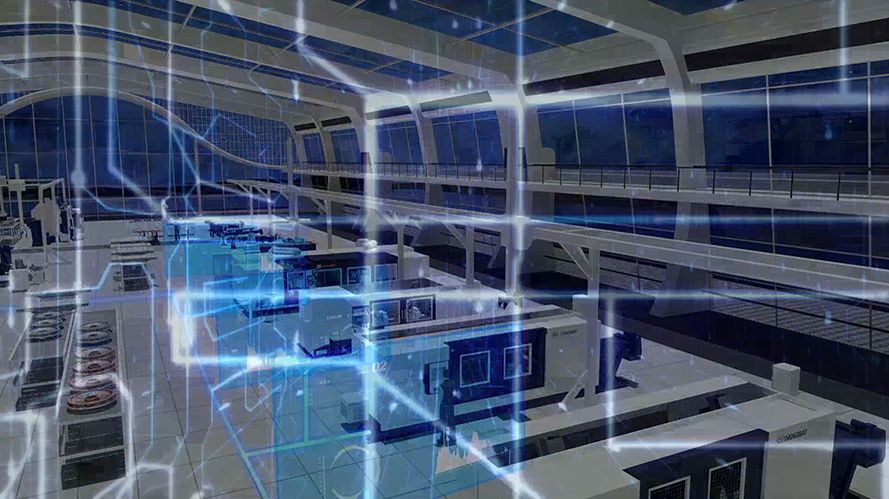Last news about IDEKO.

One of the main challenges facing Europe in the coming years is to connect the manufacturing industry to information and communication technologies to ensure that their products remain competitive on global markets. And, in this commitment to Industry 4.0, the European Commission has placed its trust in the hands of the Basque technology centre IK4-IDEKO to lead one of its main research projects in Advanced Manufacturing.
IK4-IDEKO leads the European MC-SUITE project to which it contributes its knowledge in cyber-physical systems in order to apply the latest technologies to conventional industrial environments.
MC-SUITE, which seeks to transform conventional manufacturing environments to enhance competitiveness, optimise processes and reduce costs, forms part of the "Factories of the Future" plan of action to support the industry which is integrated into the Horizon 2020 incentive program for innovation launched by the European Commission.
A single project, six activity modules
The initiative is structured around various modules starting with MC-Virtual, a section aimed at the design of new technological tools that go beyond the current limits of computer-aided manufacturing (CAM) software with the objective of acquiring knowledge of the path, final quality of the part, cutting forces and process stability.
The second block, MC-Optim, focuses on the optimisation of the multi-objective machining process including productivity and quality parameters.
The MC-CyPhy module seeks to increase productivity through the use of different embedded systems connected to a virtual model and a monitoring system.
Fourthly, there is the MC-Monitor platform, a system based on the storage of critical data in the cloud, such as signals from internal sensors of a machine, from embedded systems or data entered by operators.
The MC-Analytics module consists of creating a platform for processing information from the cloud aimed at predictive maintenance and productivity improvement.
And finally, MC-Bridge aims to be the link for comparing the result of the virtual model with the actual measurements obtained with the monitoring system. The aim is to reduce both on-line and off-line discrepancies in order to improve the machining process and its simulation.
After a year of life of the project, the first results have been obtained. "MC-SUITE has now started to significantly reduce the gap that currently exists between virtual models, i.e. programmed manufacturing processes, and the actual process as performed in workshops and on production lines."
More specifically, the MC-SUITE seeks to develop a new generation of advanced tools for simulating industrial processes through the use of cutting-edge technology applied to functions such as data acquisition, monitoring and measuring of key physical aspects for manufacturing of the final product.
The contribution of IK4-IDEKO
The technology centre, a benchmark in Advanced Manufacturing, will lead two of the project modules: MC-Virtual and MC-CyPhy.
In this section, IK4-IDEKO will use its knowledge in advanced cutting process techniques and in dynamic effects that cause chatter (vibrations produced during the machining process) to contribute to the design of tools in computer aided manufacturing.
Furthermore, IK4-IDEKO is working on the MC-CyPhy section, which is aimed at transforming embedded systems for chatter suppression in cyber-physical systems capable of interacting with the environment to perform a self-diagnosis of the situation or of failures.
Handling large data volumes
After the first year of the project, the MC-Monitor monitoring platform has now been installed in two end-user machines. The function of the MC-Monitor is to collect the data from the machine, the operator and the various sensors located in the workshop using the cloud infrastructure.
The MC-Monitor architecture involves four main activities: collection of raw data, data processing, data publication and lastly data storage.
The machines have been improved thanks to the better use of the machine's internal sensors and the new added sensors for monitoring other signals, such as energy consumption, vibrations and temperatures. Moreover, the machine operator has the option to comment on the evolution of the process using a microphone installed on the control panel, and to enter additional information manually by means of a predefined options list. Another of the added functionalities is the recording of the cutting process and remote assistance.
The data from the numeric control and from the vibration sensors is collected and transmitted in real time to the cloud infrastructure for its later processing, filtering and structuring before being stored and distributed in the form of flows.
The project techniques have been focused on two tasks: the machine sensorisation and the preprocessing of the data collected by the sensors.
Virtual processes for an optimal part finish
The role of the MC-Virtual platform is to simulate the machining process so that the most important process parameters can be predicted, such as the cutting force and surface finish. The simulation of physical operations in digital environments has allowed us to reduce and even eliminate physical tests before costly production.
At this point of the project, the MC-Virtual workflow was implemented to manage the execution of the software that simulates the process, which allows the calculation of the part geometry to be improved so the surface finish can be simulated.
The project, in which 12 organisations from 7 different countries of the European Union take part, has a significant presence of Basque organisations. Apart from the coordination by IK4-IDEKO, the machine tool company Soraluce, part of the DANOBATGROUP, AEROMEC, and Mondragon University, are also involved. The consortium also includes multinationals such as Fidia from Italy and Sintef from Norway.